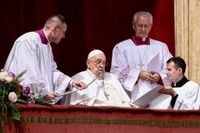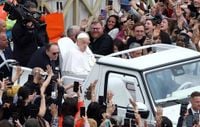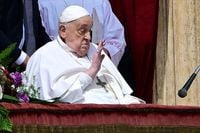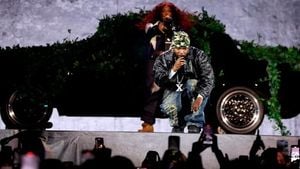Vatican City is mourning the loss of Pope Francis, who passed away at the age of 88 on Monday, April 21, 2025, during the Easter celebrations. His death marks a significant moment for Catholics around the world, as he was a prominent figure in the global religious landscape.
The Pope had made a brief appearance on the balcony of Saint Peter's Basilica just a day before his death, on Sunday, April 20, 2025. This was his first public appearance since a long hospitalization that began a month earlier. Despite his frail condition, he greeted thousands of worshipers gathered for the Easter Mass, wishing them "Happy Easter" in a voice that was noticeably weak.
During the Easter service, Pope Francis delivered his traditional "Urbi et Orbi" blessing, which translates to "to the city and the world." This blessing was broadcast worldwide, allowing millions to partake in the solemn moment. The Pope's message emphasized the importance of freedom of thought and expression, urging leaders not to succumb to fear. He also addressed the ongoing humanitarian crisis in Gaza, calling it a "dramatic and ignoble situation," and warned of the rising tide of anti-Semitism globally.
In a poignant moment that captured the hearts of many, Pope Francis, who was in a wheelchair and had just recently recovered from a 38-day hospitalization due to double pneumonia, took a brief ride through the crowd in his "Popemobile." This surprise meet and greet lasted about fifteen minutes, allowing him to connect with the faithful who had gathered to see him.
Prior to the Easter Mass, he had met privately with American Vice President J.D. Vance at the Vatican's Sainte-Marthe residence, where he had lived since his election in 2013. This meeting, described as a brief encounter, highlighted the Pope's ongoing engagement with global leaders.
Despite his health challenges, Pope Francis had made several public appearances in the days leading up to Easter, including a message delivered during Holy Week. However, he missed many key events of the week, including the Way of the Cross at the Colosseum and the Easter Vigil, indicating the severity of his condition.
The Vatican announced that Pope Francis's body would be displayed at 8 p.m. in the chapel of the Sainte-Marthe residence, allowing the faithful to pay their respects. His passing has left a profound impact on the Catholic community, as many reflect on his contributions to the Church and his advocacy for social justice, peace, and interfaith dialogue.
As news of his death spreads, tributes have poured in from around the globe. Many remember Pope Francis for his humility, compassion, and ability to connect with people from all walks of life. His leadership style was marked by a focus on the marginalized and a commitment to addressing the pressing issues of our time, including climate change, poverty, and migration.
In his final days, the Pope's messages resonated deeply with many, as he called for peace and understanding in a world often divided by conflict and fear. His insistence on the need for religious freedom and the protection of human rights will likely be remembered as a cornerstone of his papacy.
The world now watches as the Vatican prepares for the next steps following his death, including the process of selecting a new pope. As Catholics and others around the world mourn the loss of a beloved leader, they also celebrate the legacy he leaves behind—a legacy of hope, compassion, and a call to action for justice and peace.
Pope Francis's death during such a significant time in the Christian calendar adds an additional layer of poignancy to his passing. As Easter symbolizes resurrection and renewal, many will look to his example as they navigate their own faith journeys in the days to come.
As the Catholic Church enters a new chapter, the influence of Pope Francis's teachings and his compassionate approach to leadership will undoubtedly continue to inspire and guide millions.






